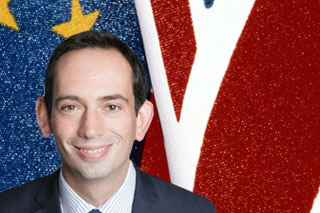Fion Veseli works as a Junior Data Analyst at Vermetten and has made an impressive mark on the Advisory team in a short time. Read below how he likes


In this interview, James Knightley, who is a senior economist at ING London, talks about why Brexit came to the forefront and what his view is on Brexit.
Could you explain something about yourself, your education and about your career?
I studied economics at the University of Durham in the North East of England and upon graduation I got a job in the graduate recruitment team of ING Barings. I joined them in 1998 and I have been with ING ever since. I started off as a junior economist and gradually took more responsibility. Currently, I am a senior global economist at ING. The reason I chose to be an economist is that I excelled in economics during my school period. For me it was the most interesting subject, so I wanted to obtain a degree in that direction. But then in terms of what you do after that, well most of my friends became accountants or management consultants. There was not a lot of opportunity to become an economist, as there were very few and far in between really. I was just very lucky to be in the right place at the right time.
What is the actual reason Brexit came to the forefront in the United Kingdom?
The primary cause was the rise of the United Kingdom Independence Party (UKIP). I think the UK has always had a very hot and cold relationship with the EU. The UK population felt that they had signed up for a free trade area, but ended up with much, much more. The whole political integration was not something that the majority of people in the UK have ever been interested in, but as the EU has become closer and closer together, the Euro zone has come through more developed. Is the EU something that is not of use to the people of the UK anymore? This sentiment has manifested itself in great support for the UKIP and at the last European elections they were the largest party. They took over a third of the votes. We were heading towards the UK general election last May and the concern for David Cameron was that UKIP could potentially take a lot of Conservative Party votes. So what he chose to do was to try, and the best chance of winning was to nullify the effect of UKIP, and saying: “well if you vote for UKIP, it is basically a protest vote, nothing comes of it. And if you vote for me, I will promise you a referendum on the UK staying a member of the EU and can actually have your say”. And this does appear to have worked. Ahead of the election, it was widely assumed that a coalition would need to be formed, and David Cameron may not be the next prime minister, but it does appear to have had some success. And we got a conservative majority government with David Cameron remaining as prime minister, so I think it is very much wrapped up in this sort of anti-establishment party, the UKIP party, doing so well and the conservatives fearing that this would mean that they will be kicked out of government.
The opinion polls are very close at the moment. They suggest it is literally 50/50 in terms of how people are thinking. Of course, there is a large proportion of the population that just do not know. It is probably around 20% of people, who are not certain of how they would vote, so that is the main key campaign ground. You have 40% of people saying that they want to stay in the EU, and you have 40% of people who want to leave, and then there is 20% of people in the middle, who just do not know. So if you look at the demographics, the people that are pre-dominantly pro EU tend to be younger and more educated compared to the people who prefer to leave. Now this largely reflects the fact that the perception is that we had 1.5 million migrants from the EU coming in recent years. They have been dampening the pay and employment prospects for the local population. Particularly, we see a lot of people with low skills coming into the UK and that has been a key battleground in terms of this debate.
There are three main issues. One is migration. The UK has taken in 1.5 million migrants from the EU in a relatively short space of time and this has led to a lot of concerns amongst certain demographics about the changing structure of the UK. Some people say this is an opportunity. They say this has been a huge relief for the UK economy and it improves prospects and wealth of incomes. So there are two sides, but migration is the main driver of unhappiness in the UK.
The second story that is related to the vote to leave is the cost to leave. The UK spends around 8.5 billion pounds a year in net contributions to the European Union and they may argue that this is money that can be better spend by the UK itself. We can use it to pay our debt; we can use it for investing in the UK economy rather than investing in other countries within the EU. You can say 8.5 billion pound is not much when your national debt is 1.6 trillion pounds of course, so it is not a huge saving. Nonetheless, people feel that this is money that should stay in the UK.
Lastly, the third point that people (who want to leave) highlight is regulation and bureaucracy. They believe that the EU is an undemocratic, unelected group of people, who have too much influence in the way the UK operates in terms of the number of laws and regulations that are imposed. This of course also gains a lot of support from the people in the UK. They do not like the way this foreign body interferes in the way the UK operates. That is something you accept or you do not accept. It is part of the single market.
What is your view on the Brexit, should the UK stay or leave the EU?
This is a difficult one, because there are two arguments. I am an economist, so I tend to focus more on the economic arguments. And the economic arguments would suggest that the UK is probably better off staying in. That is largely due to the fact that we are going to have a huge period of uncertainty if the UK does vote to leave. The UK may vote to leave and might be able to get a deal very quickly and everything goes fine, which if that is the case then that is great. But my concern is that the UK would have two years to create a deal on trade and access to the single market. Will that two-year period be enough? I do not know. My point of concern is that we are going into a period in Europe in politics, which can be very volatile. We have got French elections, German elections, Dutch elections, Italian election, and possibly another Spanish elections within the next two years. Now all of these countries have rising political uncertainty and some of these anti-establishment parties are doing very well in these countries. Look at Marine Le Pen in France; look at Geert Wilders in the Netherlands, for example. These people could seize on the opportunity if they are seeing the UK getting a good deal very easily. They could say: “actually we are not fans of the EU either and we see that the UK got a good deal. We want to leave, we want a good deal.” It is not in the interests of the establishments, I would argue to give the UK an easy ride on this. My concern is that it could be a very difficult period of negotiations.
Read in the next part more about how James Knightley looks towards Brexit.






















